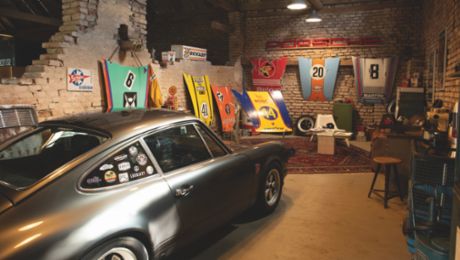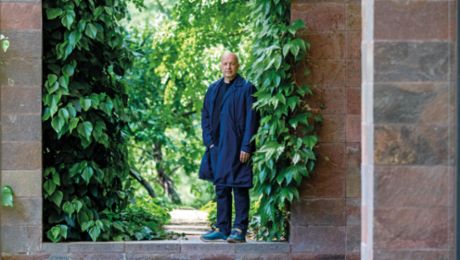David Horvath has an impressive CV: three-time German champion in cross-country cycling, long-time rider in the national team and member of the perspective Olympic squad. In 2019, he had planned to make his debut at the Downhill World Cup.
On a rainy day, he headed to the course in Val Di Sole, Italy, for his last training run before qualifying. Such a challenge is only suitable for absolute professionals like him. The track was wet, with tree roots protruding from the ground. On that day, Horvath made a life-altering decision to change his tyres for the second run. “Trying out tyres I’ve never used before isn’t something I really do,” he says. However, the conditions in Val Di Sole left him no choice. It would be a decision that would have consequences that nobody could have anticipated.
Horvath’s mountain bike slipped on some wet wood, causing him to lose his bearings and land in a ditch. He does not remember the moment of the impact, and only regained full consciousness when being treated by paramedics. When he tried to stand, he realised that his legs were not reacting as they should, and sensed that his life was about to change drastically. From that moment on, Horvath was dependent on a wheelchair.
A positive mindset and total acceptance
Now, almost five years on, he speaks openly about his accident. There is no hint of regret, no ‘what if?’ – that’s not the type of person Horvath is. He says that “everyone is fighting their own battles. We all feel and experience the same struggle.” He believes that we are not bound by external circumstances and instead chooses to focus on the things that he can influence himself. His motto is: “It doesn’t matter what you look like. What matters is what you do.”
Horvath trained as a business manager and has earned a position as an assistant to the Executive Board for a mechanical engineering company. Together with his friend Torben Drach, a German Enduro champion, he coaches the self-founded Rotwild Schwalbe Gravity Team and has even returned to the mountains himself with an adapted mountain bike: a type of recumbent bike with three wheels that is tailored to his needs.
On that fateful day in 2019, Horvath broke his eighth thoracic vertebra and compressed his spinal cord, causing him to lose all feeling below the chest. It was a real turning point in the life of the former professional athlete. “As far as no longer walking is concerned, I’m prepared for that. The loss of sensation is the difficult part of my everyday life,” he explains. But he refuses to be limited by his wheelchair: Horvath quickly perfected the wheelie and even learnt how to get downstairs in his chair. For him, only the way he does things has changed. His positive approach to life remains as strong as ever: “We have to accept ourselves despite our differences.”
He has no interest in pity. Instead, he is trying to improve his situation bit by bit. For example, he saw potential in his current mountain bike, so he designed a new prototype together with his friend Torben and is now planning to enter the market: “I want to give people who are disabled the opportunity to get out into nature and return to activity in a safe way.” The project is very close to his heart.
When the 28-year-old is on his mountain bike today, the past does not matter: speed – pushing the limits of movement – is something that remains as exciting as ever. He is not afraid of another accident: “The moment you think about what might be, you’re no longer riding freely.” Horvath feels at ease in those boundary-pushing moments. This requires him to take risks and aim for high speeds.
Dreams can change the world
Horvath’s need for speed exists beyond mountain biking. He also has a passion project that he is working on in his garage. Together with two friends, he is restoring the sports car of his dreams: an air-cooled Porsche 911. Horvath can operate the pedals using a hand throttle and can easily switch gears. The Sportomatic gearbox engages automatically for him and allows him to stop in fourth gear if necessary. Again, Horvath has found a way to adapt to his circumstances.
“I don’t drive my Porsche to impress anyone. When I’m driving, I feel at one with the car,” he explains. Controlling its speed – sometimes fast, sometimes slow – gives him a sense of calm that he can’t find anywhere else. “Sitting at the wheel, listening to the engine and feeling the power of the car… It’s difficult to put into words, but that’s how I unwind after a stressful day.”
Horvath deliberately places the wheelchair in clear view on the passenger seat. He often gets grumpy looks when he takes a little longer at the petrol station – until people spot the wheelchair. At that point the reactions become positive. “People are irritated for a short time; it is something new for them, after all,” explains Horvath, who remains grateful despite the resistance from others. “As someone with a disability, achieving a dream like this is not something you see every day.”
But if anyone knows how to break away from stereotypes, it’s this man. He is constantly challenging preconceptions and exploring new possibilities. “Only you can control how you shape your own life,” he says. The accident opened up new perspectives for him and taught him to be more grateful. His relationship with his girlfriend has also become closer than ever despite the challenge. In their private lives, Horvath and his friends try to exemplify inclusion and raise awareness of disability. He wants to make mountain bike tournaments accessible to people with disabilities in Germany. With his positive attitude, he leaves us with no doubt that these dreams will become reality.




